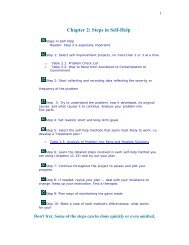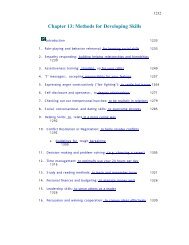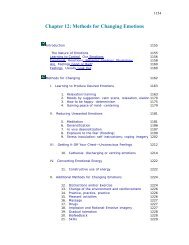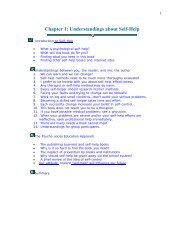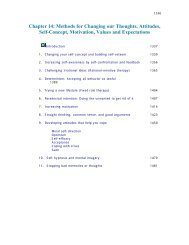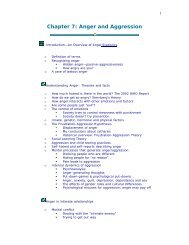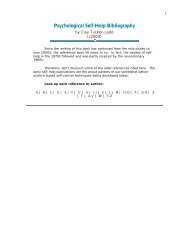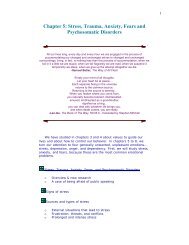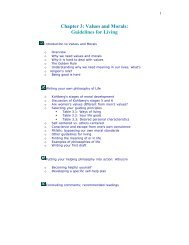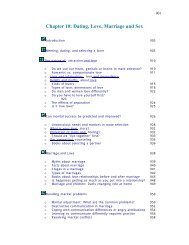Methods for Changing Behaviors - Psychological Self-Help
Methods for Changing Behaviors - Psychological Self-Help
Methods for Changing Behaviors - Psychological Self-Help
You also want an ePaper? Increase the reach of your titles
YUMPU automatically turns print PDFs into web optimized ePapers that Google loves.
Purposes<br />
· To consider periodically one's options in a given situation to<br />
determine what are the better alternatives in the long run (so<br />
you keep changing as circumstances change). In some<br />
situations we are meeting our needs in ways that could be<br />
better met by some other behavior, e.g. a specific plan will<br />
solve a problem better than endless worry, a commitment to<br />
helping others reduces feelings of uselessness better than<br />
endless depression, becoming an alcoholism counselor meets<br />
many of the same needs as the drinking met, going back to<br />
school may offer better ways to make a living than continuing<br />
in the same old minimum wage job, etc. In short, you may<br />
need new behaviors.<br />
· To develop new and better ways of responding to a situation by<br />
observing models or reading and discussing it with others.<br />
· To learn how to utilize self-instructions to modify behavior and<br />
increase self-control.<br />
· To understand the need <strong>for</strong> repeated practice of a new<br />
response be<strong>for</strong>e we become accustomed to using it and it<br />
eventually becomes an established habit.<br />
This might involve changing your response from being late to being<br />
punctual, from being impulsive to being careful, from criticizing to<br />
giving compliments, from being alone to socializing, from being a late<br />
sleeper to being a 6:00 AM jogger, etc.<br />
Steps<br />
STEP ONE: Consider alternative ways of responding; select a<br />
part of your life that needs to improve.<br />
In some cases, it is painfully clear to us that we are failing, goofing<br />
off or hurting, and need to change. In other cases, we may simply see,<br />
hear or read of someone handling a situation well and want to try<br />
doing something better than we have been. On still other occasions,<br />
we may have given no thought to handling a situation differently...but<br />
perhaps we should. Wise observers realize most of us frequently<br />
respond out of "habit" rather than because we have consciously<br />
decided that this is the best way to handle the situation. We are "flying<br />
on automatic" or "set in our ways," even if we are young. Of course,<br />
you can't question every little thing you do. However, it pays to be<br />
open- minded about the possibility of improving.<br />
A few examples might help: suppose you are always agreeable and<br />
compliant and willing to "give in," perhaps you should learn to be more<br />
self-directed and assertive (chapter 13). Suppose a person is very<br />
close to a group of old friends; he/she is very com<strong>for</strong>table with these<br />
friends; yet, that person might grow more, experience more, and<br />
become better adjusted and more successful if he/she had other<br />
friends in addition to these. We can become our own worst restricter,<br />
1077



